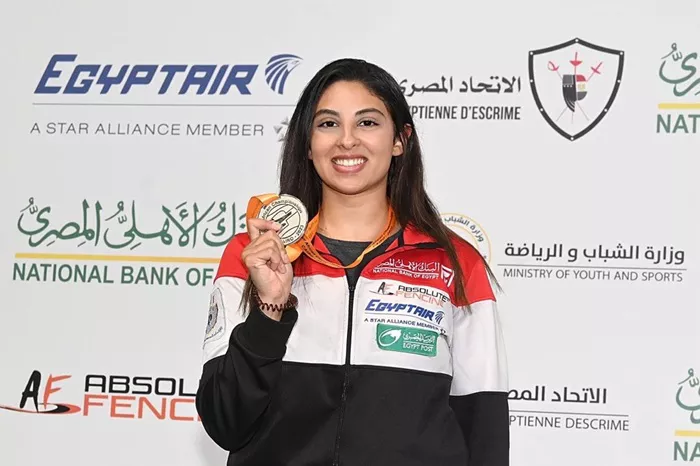PARIS (AP) — Olympic athletes often use Instagram to share their achievements and struggles. Last week, Egypt’s Nada Hafez shared a unique story following her fencing event.
Hafez revealed she had been competing while seven months pregnant. “What might look like two players on the podium was actually three!” she posted alongside a touching photo from the match. “It was me, my competitor, and our future little one!” Despite the challenge, Hafez and her baby finished the competition ranked 16th, marking her best result in three Olympic appearances.
The day after Hafez’s revelation, Azerbaijani archer Yaylagul Ramazanova also shared on Instagram that she competed while six-and-a-half months pregnant. Ramazanova told Xinhua News she felt her baby kick before making a perfect shot, scoring a 10, the highest possible score.
While pregnant Olympians and Paralympians are rare, they have competed before, often earlier in their pregnancies or without realizing they were expecting. U.S. beach volleyball star Kerri Walsh Jennings, for example, won her third gold medal in 2012 while unknowingly five weeks pregnant with her third child. Jennings, who had recently started trying to conceive, was surprised when her volleyball partner Misty May-Treanor suggested she might be pregnant.
Dr. Kathryn Ackerman, a sports medicine physician and co-chair of the U.S. Olympic and Paralympic Committee’s women’s health task force, explains that as attitudes and knowledge about pregnancy and athletic performance evolve, more athletes are pushing boundaries. “We’re seeing more of this as women break the myth that high-level exercise isn’t safe during pregnancy,” Ackerman said. She noted that while past decisions often lacked data, current recommendations support high-level training and competition for athletes in good condition with uncomplicated pregnancies. Ski racing is one exception due to the high risk of falls.
In contrast, sports like fencing and archery, which are less physically demanding, pose fewer risks. Ackerman points out that fencing involves protective padding, and archery and shooting are less physically intense.
Pregnant athletes face unique emotional challenges. Serena Williams, who won the Australian Open in 2017 while pregnant, chose to step back from tennis when trying for a second child. Williams wrote in Vogue, “I never wanted to choose between tennis and a family. If I were a man, I wouldn’t have to make this choice.”
Williams welcomed her second child, Adira River Ohanian, in 2023, joining her older daughter Olympia. U.S. softball player Michele Granger also experienced this dilemma in 1996, when she pitched the gold-medal-winning game in Atlanta while pregnant. Although her mother suggested naming the baby Olympia and her husband preferred Athena, Granger chose not to name her child after her own athletic achievements.
At the Paris fencing venue, reactions to Hafez’s performance varied. Some admired her bravery, while others questioned the risks involved. Pauline Dutertre, a former international saber competitor, acknowledged the courage required but noted the inherent risks in combat sports.
Marilyne Barbey, who attended the fencing from Annecy, France, also questioned the safety but respected Hafez’s decision. “You can fall anywhere, at any time. In the end, it’s her choice,” she said.
Ramazanova, who was visibly pregnant during her competition, received praise from her peers. American archer Casey Kaufhold, who won bronze in the mixed team category, praised Ramazanova’s achievements. “It’s really cool to see more expecting mothers in the Olympics, especially in archery,” Kaufhold said. “I hope it inspires more mothers and expectant mothers to compete.”
Kaufhold added a personal note: “It’s wonderful that one day Ramazanova can tell her child, ‘I went to the Olympic Games, and you were there too.’”


